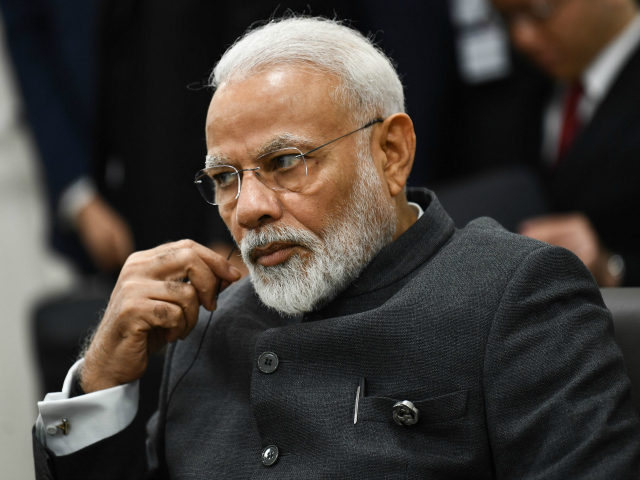Indian Prime Minister Narendra Modi’s approval rating fell to 63 percent this month, the lowest such figure recorded by the U.S.-based data intelligence company Morning Consult since it began tracking the leader’s popularity in August 2019.
The prime minister’s approval rating decreased from 73 percent on April 1 to 63 percent on May 11, according to Morning Consult data.
Modi’s approval plunge coincided with a massive surge of India’s Chinese coronavirus caseload starting in early April. The spike in new infections and deaths from the disease has continued at an unrelenting pace over the past month and a half and placed India’s healthcare system and crematoria under unprecedented strain. Local news reports from the national capital territory, Delhi, revealed that several hospitals were forced to discharge critically ill coronavirus patients or stop treating them in recent weeks due to a lack of sufficient beds or medical supplies, such as oxygen. Most crematoria in Delhi have operated beyond capacity over the past month as they struggle to process thousands of coronavirus victims, with some forced to build makeshift funeral pyres in nearby parking lots and public parks to keep up with demand.
Modi’s response to India’s latest coronavirus crisis has been met with heavy criticism from his political opponents, with some alleging his government, run by the Hindu nationalist Bharatiya Janata Party (BJP), is partially responsible for the surge in new cases since April because it allowed mass public gatherings to take place across India in the months leading up to the caseload spike. Critics have also lambasted Modi’s rollout of Chinese coronavirus vaccines available in India, as the prime minister boasted of exporting massive shipments of the vaccines to foreign countries in mid-April despite acute shortages of the vaccines domestically at the time.
“This year despite many constraints, we have supplied vaccine[s] to over 80 countries,” Modi said in a speech April 13. “During this pandemic, in our own humble way, within our own limited resources, we in India have tried to walk the talk. We have tried to protect our own 1.3 billion citizens from the pandemic. At the same time, we have also tried to support the pandemic response efforts of others.”
Residents of India’s northeastern state of Assam told the Times of India on April 14, just one day after Modi’s vaccine export speech, that they were recently turned away from receiving their second dose of a Chinese coronavirus vaccine at a state-run clinic due to insufficient supplies. India’s vaccine shortage became so severe by late April that several state-run Chinese coronavirus vaccine clinics in Mumbai were forced to shut down for days at a time due to a lack of stock.
Police in Delhi arrested 25 people on May 16 for placing posters critical of Modi’s vaccine rollout on the walls of public buildings across the national capital.
“Modi, why did you send vaccines meant for our children to foreign countries?” the posters read.
The leader of a left-wing opposition party in India called the Aam Aadmi Party (AAP) confirmed to India’s The Print news site this week that fellow AAP members paid local Delhi residents to paste the anti-Modi posters on walls across the capital.
“We have got these posters out across Delhi and I want to ask Modi’s Delhi Police that how can you arrest people for putting up some posters in a democracy like ours?” AAP chief Durgesh Pathak said on May 16.
“If you still wish to arrest people, then please arrest me and not innocent poor people. The whole country is in fact asking why were vaccines meant for our kids sent to other countries — to Pakistan — and not saved for our own kids,” he added.

COMMENTS
Please let us know if you're having issues with commenting.